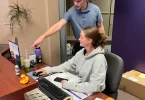Within the past few weeks, Ohio Gov. Mike Dewine has taken precautions to slow the spread of the COVID-19 by advising colleges and universities to suspend in-person classes, closing public schools, restaurants and bars, and asking all persons of non-essential businesses to stay home.
Sherri Winegardner, director and associate professor of nursing at Bluffton University, said COVID-19 has many elements to make it a concerning disease for humans. One is that it’s highly contagious and has demonstrated higher mortality rates than influenza.
“I think that everyone needs to understand that the disease COVID-19, caused by the SARS-CoC-2 virus, is a novel, or new virus and hasn’t affected humans before,” said Winegardner. “Since it is a new virus, we have no natural immunity, there is no currently known or approved treatment, and we don’t have an available vaccine.”
With the knowledge that this disease is so contagious, the United States has been trying to limit the spread or as Winegardner explained “flattening the curve.” Many states, including Ohio, have transitioned to a stay at home rule with an exception to those who have jobs with essential businesses.
“The disease is not selective, and there are cases of severe disease and mortality in all age groups although those in the over 70 age group are showing the highest rates of mortality from COVID-19,” said Winegardner.
Winegardner explained that social distancing, which includes staying home and maintaining at least six feet of distance from others when it is necessary to be out, is necessary to stop the spread. She said it also involves limiting any movements outside one’s home to only take essential trips such as groceries, medications and physician visits. Winegardner said regardless of one’s age, everyone needs to follow the directions on social distancing.
“What is most critical now is limiting the spread of the disease to prevent overwhelming our healthcare system with the seriously ill,” Winegardner said.
It is important to take these precautions seriously as the healthcare system has limited supplies and equipment to work with.
“The number of hospital beds, and particularly intensive care unit beds, are limited in numbers,” Winegardner said. “A massive influx of patients can overwhelm the system and negatively impact our ability to provide adequate care.”
When asked, Winegardner how people can be cautious that they do not mistake everyday cold or allergies for the virus, she said they should be concerned about the development of any form of respiratory illness, particularly if a fever begins. If an individual develops respiratory symptoms and a fever to notify their healthcare provider for guidance.
Social distancing can help solve the spread between people outside of one’s home, but for those who have family members returning to work every day, it is important to continue to wash your hands and cover your coughs and sneezes.
“I understand that staying inside our homes and practicing social distancing are difficult in a society as mobile as ours, but it is our only means for getting through this challenging time, and it requires cooperation from all of us,” Winegardner said.






